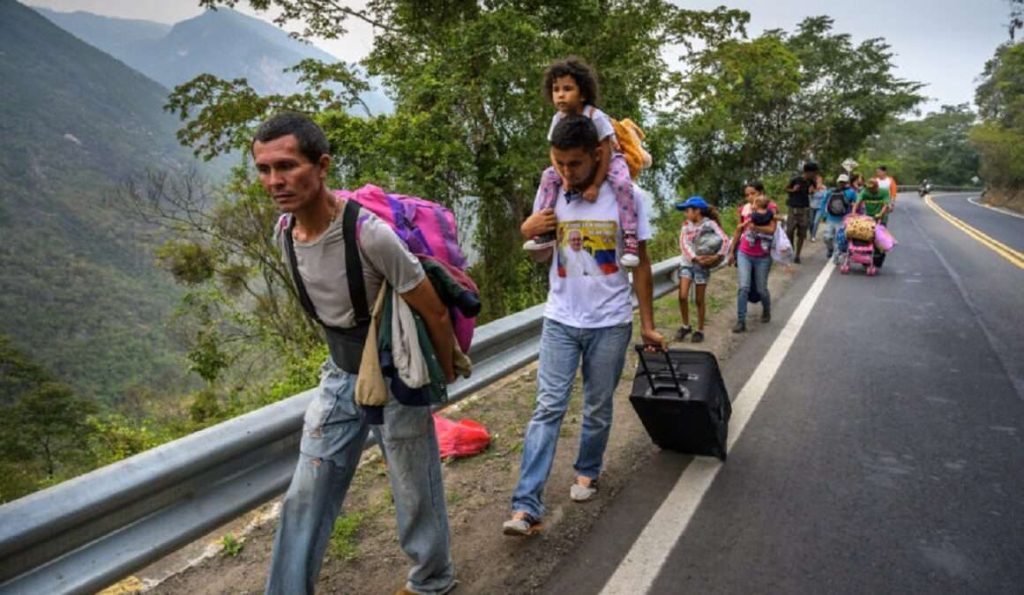Venezuelans fleeing the socialist regime of Nicolas Maduro. (NA)
Yesterday, the Biden Administration decided not to extend the parole term for participants in the CHNV private sponsorship parole program for migrants from Cuba, Nicaragua, Haiti, and Venezuela:
The Biden administration will not be extending the legal status of hundreds of thousands of migrants who were allowed to fly to the U.S. under a sponsorship program designed to reduce illegal border crossings, the Department of Homeland Security announced Friday.
Instead, migrants who have come to the U.S. under the policy will be directed to try to obtain legal status through other immigration programs, leave the country or face deportation proceedings.
The administration first launched the sponsorship program in October 2022 to discourage Venezuelans from traveling to the U.S.-Mexico border by offering them a legal way to enter the country if American-based individuals agreed to sponsor them. It was then expanded in January 2023 to include migrants from Cuba, Haiti and Nicaragua, whose citizens were also crossing the U.S. southern border in record numbers at the time.
As of the end of August, 530,000 migrants from these four countries had flown into the U.S. under the policy, known as the CHNV program, government figures show. They were granted permission to live and work in the U.S. legally for two years under an immigration law known as parole, which presidents can use to welcome foreigners on humanitarian or public interest grounds.
Roughly 214,000 Haitians, 117,000 Venezuelans, 111,000 Cubans and 96,000 Nicaraguans have come to the U.S. so far under the policy, according to government data. The first group set to start losing their parole status this month are Venezuelans, who began coming to the U.S. through the CHNV program in October 2022. The parole periods of Cubans, Haitians and Nicaraguans will not start to expire until early next year.
This decision is simultaneously cruel and counterproductive. It’s cruel because the horrific conditions that justified the creation of the program in the first place are highly unlikely to end in the next year or two. Cuba, Venezuela, and Nicaragua will likely still be ruled by brutal socialist dictatorships. And Haiti will likely still suffer from endemic violence. The statute that empowers the president to grant parole states it can be given “for urgent humanitarian reasons or significant public benefit.” The “urgent humanitarian reasons” justifying it in this case are highly unlikely to end anytime soon. The same goes for the “significant public benefit” of reducing disorder at the border. CHNV reduces illegal migration by making the legal alternative easier and more widely available. Instead of curtailing the program, Biden should expand it.
The Biden administration did (rightly) extend the parole period for Afghan and Ukrainian participants in similar parole programs. The case for CHNV participants is equally compelling.
Moreover, the predictable consequence of this decision—unless it is reversed—will be to create a larger population of illegal migrants. Migrants from Cuba, Nicaragua, and Venezuela can’t be deported, because those countries won’t accept US deportees. And most are unlikely to leave on their own, because even living in the US illegally is less bad than returning to the terrible conditions their home countries. Haiti does accept US deportations, but many Haitians are likely to remain illegally, nonetheless.
Losing legal status will obviously be bad for the migrants themselves. But it’s also bad for the US economy and society. Migrants with legal status can work at a wider range of jobs, and become more fully integrated into our society. That makes them more productive, increasing their economic and fiscal contributions. The Congressional Budget Office estimates increased migration since 2021 will reduce the federal budget deficit by almost $1 trillion over the next decade. CHNV migrants contribute to that, and can contribute more if we extend their legal status.
Some CHNV migrants are likely to be able to get temporary or permanent legal status by other means; for example, Haitians and Venezuelans who entered the US before before June 4, 2024, and July 31, 2023, respectively, are eligible for Temporary Protected Status (TPS). But may are likely to be left out in the cold, either because they don’t fit the relevant categories or because they lack the skills necessary to navigate the labyrinthine immigration bureaucracy.
The administration recently temporarily shut down CHNV, citing largely bogus concerns about fraud. It then restarted it, with a few additional rules.
The program has also been challenged in court by various GOP states. The legal challenges are based on badly flawed arguments. Earlier this year, a conservative district judge ruled the states lacked standing to bring the case, which is now on appeal).
In sum, the net effect of Biden’s decision will likely be to harm migrants fleeing violence and oppression, damage the US economy, and create more disorder. Great job, Mr. President!
Of course the real motive for this step may be political, trying to give Kamala Harris a boost in the upcoming election. If so, I doubt it will succeed. Swing voters are generally ignorant of policy details—even more so than committed partisans, and few are likely to even be aware of this decision, much less change their votes because of it. The kinds of intensely nativist voters who do know about the shift and support it are highly unlikely to vote for Harris, regardless.
Admittedly, I have not seen any good polling data on this particular issue. And it’s important to guard against the temptation to think that one’s own policy preferences are necessarily popular (I know all too well that many of mine are not). Perhaps new surveys will prove me wrong about the political effects of this step, though I doubt it.
Since the beginning of the Uniting for Ukraine program, on which CHNV is based, I have argued that Congress should give participants in these programs permanent legal status. They should pass a modified version of the Venezuelan Adjustment Act (sponsored by GOP Rep. Maria Elvira Salazar), and similar legislation to cover the Ukrainians and others. The fate of these people should not be left up to the whims of whoever occupies the Oval Office. Sadly, however, such legislation is highly unlikely to pass before the November election.
If Trump wins, it will almost certainly not pass afterwards, either. There was a time when the Republican Party would have (rightly) pilloried Biden for this betrayal of refugees from socialist oppression. Today’s GOP, sadly, prioritizes nativism over anticommunism. Many also favor nationalist economic policies that resemble socialist ones.
If Kamala Harris prevails, I hope she might reverse Biden’s misguided decision on parole extension, and promote adjustment acts that will resolve the issue permanently.
The post Biden Foolishly Decides Not to Extend Legal Status for Migrants Who Entered the US Under the CHNV Private Sponsorship Program appeared first on Reason.com.







